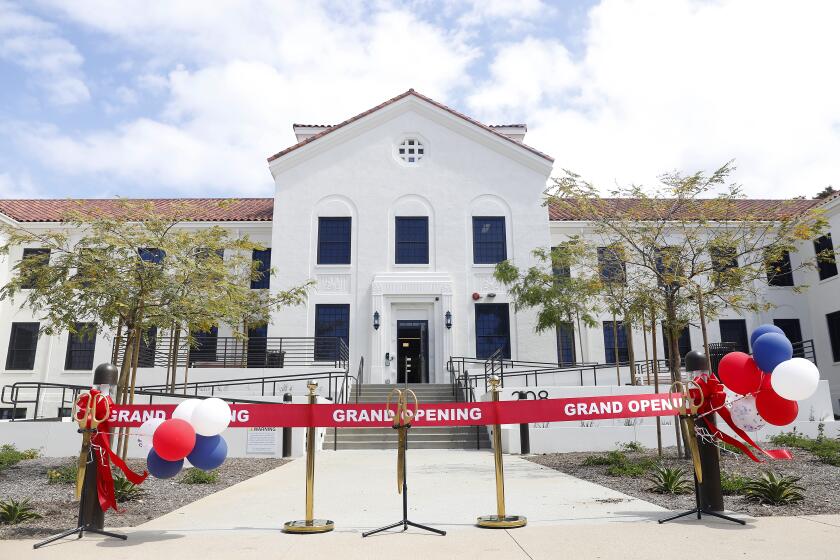Homeless Advocates Sue L.A. Over Downtown Plan
A coalition of community groups has filed suit against the city of Los Angeles, arguing that a new plan to revive downtown fails to specify how the city will assist downtown’s neediest residents--thousands of people living in residential hotels, in shelters, or sleeping on the streets.
The lawsuit, filed on behalf of the Los Angeles Coalition to End Hunger and Homelessness, asks the court to order the city to amend the plan--or to find it invalid.
The goal of redevelopment is to revitalize blighted areas. The lawsuit essentially asks whether redevelopment law--and the city’s use of it--are strong or thorough enough to address the extreme poverty of skid row.
The goal of the lawsuit, advocates say, is to force the city to detail how its City Center Redevelopment Plan will provide housing or jobs for people displaced by redevelopment efforts.
“We’re afraid that without doing that, [the redevelopment plan] is actually going to exacerbate blight rather than alleviate it,” said Barbara Schultz of the Legal Aid Foundation of Los Angeles, which represents the coalition. “What’s going to happen to those thousands of people? If they’re not getting relocation [assistance] and there’s no replacement housing? They’re going to be out on the street.”
Officials with the Community Redevelopment Agency declined to comment on the lawsuit, but said the plan’s primary goals include the creation of housing and the reduction of homelessness. The specifics of the plan will evolve over time, they said.
“We have a 30-year plan horizon,” said Don Spivack, a CRA spokesman. “It’s virtually impossible at the outset to anticipate every activity you’re going to take.”
In May, the Los Angeles City Council approved a plan to redevelop an 879-acre area in the eastern and southern quadrants of downtown Los Angeles. CRA officials say the area will generate up to $2.4 billion in revenues over 45 years and create up to 6.7 million square feet of commercial and industrial development.
Redevelopment law requires that 20% of funds generated by the area be set aside for housing. Under the city’s plan, 25% of all housing units will be for low-income residents. The plan is expected to create 12,900 units of housing, including 3,225 that will be designated for very low and low-income households, Spivack said.
According to the lawsuit, about 3,000 to 4,000 homeless people sleep on the streets of skid row each night.
Redevelopment law calls for helping displaced residents relocate. But one key question in the lawsuit: Who among skid row’s residents would qualify for relocation assistance?
This question will be determined on a case-by-case basis, said lawyers representing the city.
“If a person is living on the street, I doubt that they would qualify, because we wouldn’t be displacing them from a residence,” said Murray Kane, an attorney with Kane Ballmer & Berkman. “On the other hand, the agency spends a huge amount of money on homeless assistance programs.”
For those who are living in some form of housing, assistance will depend on the length of stay in a particular dwelling, Kane said. Those who have lived in a place for 30 days will receive moving expenses. Those who have lived in the same place for 90 days will receive rental assistance.
“If they move out every several days, they might not be eligible for anything,” he said.
But on skid row, residents are often forced to move about frequently.
Under state law, a tenancy is created when a resident has been in place 30 days. As a result, some residential hotel owners require residents to move out for a night or switch rooms once every 28 days, then re-rent a room, a practice that has been dubbed “the 28-day shuffle.”
The practice is a method of circumventing tenant protections offered under state law and the city’s Rent Stabilization Ordinance.
That ordinance, which covers buildings constructed before 1978, keeps rents low and protects tenants from certain types of evictions. It only applies, however, when a tenant has been in place at least 60 days.
Some hotel residents, such as Jerome Wiggins and his girlfriend, Joy Pearson, worry that the long-standing practice will now cause some residents to be denied relocation assistance. They may have no place else to turn for help. “From skid row, where do you go?” asked Wiggins, who along with Pearson is a plaintiff in the lawsuit.
The lawsuit asks that the city be ordered to amend the plan to provide that residents, including those prevented from establishing tenancies, will be eligible for benefits. While the redevelopment plan sets aside some housing for low-income and very low-income residents, the new housing may be out of reach for the area’s poorest residents, advocates argue.
Under redevelopment law, the city must replace housing units with units that fall in the same income category. But advocates say that even housing designated as “low income” might be beyond the means of someone who could barely afford a skid row hotel.
Low-income households are those with an income of 50% or less of the county’s median household income of about $42,000. Extremely low income is 30%.
The income range of many in the area, the lawsuit says, is 7% to 12% of median income. Advocates say the city’s redevelopment plan should state that replacement housing will be available to those residing in the project area, including those whose incomes fall below the affordable housing economic guidelines.
The CRA has drawn fire from community groups who said that the plan moved so quickly that they were not informed of its specifics or offered an opportunity to have input, a claim that is repeated in the lawsuit. “All of us are usually complaining that government moves too slow,” said Gene Boutilier, spokesman for the coalition.
“On this occasion we’re saying, ‘All of a sudden they got wind in their sails and went too fast.’ ” The coalition, which has 200 member organizations, participated in hearings and meetings on the plan, but some organizations and individuals were not informed, Boutilier said.
Spivack said the agency went beyond what the law requires in notifying the public. Notices were published and sent to residents, including residential hotel occupants.
The lawsuit is the second major suit filed against the city over the redevelopment plan. The county of Los Angeles has also sued the CRA. Boutilier was quick to distance his coalition from others who oppose the plan.
“We’re not opposed to the CRA or downtown progress,” he said.



